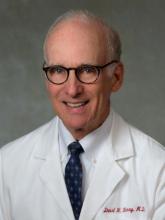In this special edition podcast, Blood & Cancer revisits an interview with Gary H. Lyman, MD, of Fred Hutchinson Cancer Research Center, Seattle, on defining and understanding biosimilars. Dr. Lyman joins host David H. Henry, MD, to explore the interchangeability of these drugs and how biosimilars are being integrated into clinical practice guidelines.
* * *
Help us make this podcast better! Please take our short listener survey: https://www.surveymonkey.com/r/podcastsurveyOct2019
* * *
This Week in Oncology
ASH preview: Key themes include tackling CAR T obstacles, sickle cell advances, VTE
By Sharon Worcester
Chimeric antigen receptor (CAR) T-cell therapies have garnered a great deal of attention given their “incredible efficacy” in treating B-cell malignancies, and new findings are taking aim at the drawbacks of therapy, such as the time, expense, and toxicity involved.
* * *
For more MDedge Podcasts, go to mdedge.com/podcasts
Email the show: podcasts@mdedge.com
Interact with us on Twitter: @MDedgehemonc
David Henry on Twitter: @davidhenrymd
Ilana Yurkiewicz on Twitter: @ilanayurkiewicz

